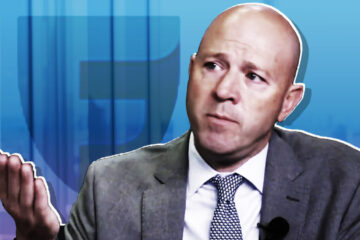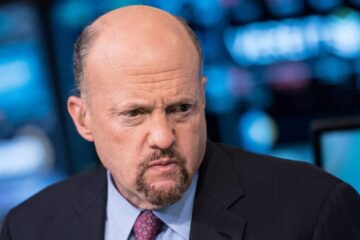There has been a lot of chaos this year, which has meant eye-popping volatility for the markets, including stocks, bonds, and currencies.
The past two years were relatively tame compared to this year. The S&P 500 delivered back-to-back gains above 20% in 2023 and 2024, including a robust 24% return last year. This year, sticky inflation, job woes, and an ongoing tussle over tariffs have created uncertainty that’s taken the stock market on a roller coaster ride.
To be sure, worries were growing coming into 2025. The jobs market had already weakened enough to cause the Federal Reserve to cut interest rates into the end of 2024, and inflation progress was slowing, providing little help to cash-strapped consumers.
Further, optimism over seemingly never-ending artificial intelligence spending growth had begun to wane, leading many to worry whether the massive run in stocks over the past two years had inflated valuations to unsustainable levels.
In short, the backdrop was already concerning before President Donald Trump took a sledgehammer to global trade, unveiling a series of harsher-than-expected tariffs on key trading partners, including China.
Related: Secretary Bessent sends message on Walmart price increases due to tariffs
The result so far from all this chaos has led to a whipsawing of markets.
The S&P 500 collapsed from mid-February through early April, falling nearly 20%, just shy of bear market territory. Then, a tariff reprieve in the form of President Trump pausing most reciprocal tariffs on April 9 kicked off a major rally that’s erased a lot of the S&P 500’s losses.
Now, however, worry is returning following Moody’s decision to downgrade the United States’ credit rating amid a new spending and tax cuts bill making its way through Congress that would cause the deficit to swell.
The bond market has seen yields rise, and signs could suggest that investors are still too complacent. This point isn’t lost on JP Morgan’s CEO Jamie Dimon.
Dimon is among the most influential CEOs in America. He commands the largest bank in the U.S. and the fifth largest globally, a role that puts his finger directly on the economy’s pulse.
Jamie Dimon, CEO of JPMorgan Chase, has blunt words on the economy, stocks, and credit market.
The economy is slowing, and Fed’s hands are tied
In so-called ‘normal’ times, a stalled economy can be jump-started by the Federal Reserve’s monetary policy.
The Fed is tasked with a dual mandate to ensure low unemployment and inflation. When the economy stutters, it can drop interest rates, increasing economic activity and boosting jobs. When it overheats, it can raise interest rates, decreasing economic activity and reducing inflation.
Related: Veteran fund manager sends hard-nosed message on Fed interest rate policy
It sounds simpler than it is. Especially this year.
The Fed is currently caught in a pickle between its goals. While unemployment has increased to 4.2% from 3.4% in 2023, suggesting rates should be cut, inflation has proven sticky and could re-exert in the wake of tariffs, suggesting rates should be raised.
In March, there were 901,000 fewer unfilled jobs in the U.S., according to the Job Openings and Labor Turnover Survey, or JOLTS. Meanwhile, over 600,000 workers have been laid off this year through April, up 87% year-over-year, according to Challenger, Gray, & Christmas.
The Personal Consumption Expenditures index showed inflation was 2.3% in March, above the 2.1% recorded last September. The core index, which excludes volatile energy and food, was 2.6% in March, solidly above the Fed’s 2% inflation target.
If the Fed cuts rates, it risks skyrocketing inflation like in 2022, and if it raises rates, it could send the U.S. economy spiraling into recession.
The dynamic has increased the odds of stagflation, a period of elevated inflation and economic weakness.
Jamie Dimon issues candid warning on economy, markets
Hope is that calmer heads prevail during trade talks, resulting in more manageable tariffs that won’t pressure inflation as much. That optimism got a boost when the trade war with China seemingly de-escalated last month, with the U.S. reducing tariffs from an eye-watering 145% to 30%.
Related: Stock market tumbles after uncommon event
However, even if tariffs eventually fall, they appear to be here to stay, and even at lower tariff rates, they will represent the largest new tax on consumers in decades.
That point was strengthened this week when Donald Trump renewed his commitment to tariffs, suggesting the U.S. slap a 50% tariff on the European Union because of a lack of progress on trade talks.
The ongoing trade battle stresses financial markets, given how interdependent businesses have become across countries. For instance, most retailers source a large proportion of their goods from low-cost production countries in Asia, and, according to the White House, only 25% of vehicle content on cars bought by Americans can be called “Made in America.”
There’s also the reality that the U.S. appetite for spending has been partly supported by trade imbalances, with nations like China and Japan owning much of our growing debt pile.
The inability to control spending is behind Moody’s downgrade of US debt, evidenced in the “Big Beautiful Bill” being debated in Washington this month. The bill, which lowers tax revenue, could add $3.3 trillion to the deficit over 10 years, according to the Tax Foundation.
Dimon worries that people are far too complacent about the risk facing the US economy.
More Economic Analysis:
Fed inflation gauge sets up stagflation risks as tariff policies biteU.S. recession risk leaps as GDP shrinksLike it or not, the bond market rules all
“The market came down 10%, it’s back up 10%; I think that’s an extraordinary amount of complacency,” said Dimon during JP Morgan’s annual shareholder event.
Dimon thinks the credit market is far riskier than people realize, saying, “I am not a buyer of credit today… Credit today is a bad risk… people who haven’t been through a major downturn are missing the point about what can happen in credit.”
He also thinks there could be a major reset in corporate earnings this year because of tariffs, bad news for stocks, given that profit growth is a cornerstone of stock market valuation.
He called the tariffs still in place “pretty extreme” and warned that “the chance of inflation going up and stagflation is a little higher than other people think.”
Dimon wasn’t completely downbeat, though. He pointed out that downturns create opportunities for companies that are ready to take advantage of them, ostensibly including JP Morgan.
“The good companies benefit from the downturn,” said Dimon. “You earn your stripes with your clients in a downturn.
Dimon’s candid take is simple: the current situation has “created a lot of risk out there. I don’t think we can predict the outcome.” That’s not very reassuring.
Related: Veteran fund manager unveils eye-popping S&P 500 forecast


